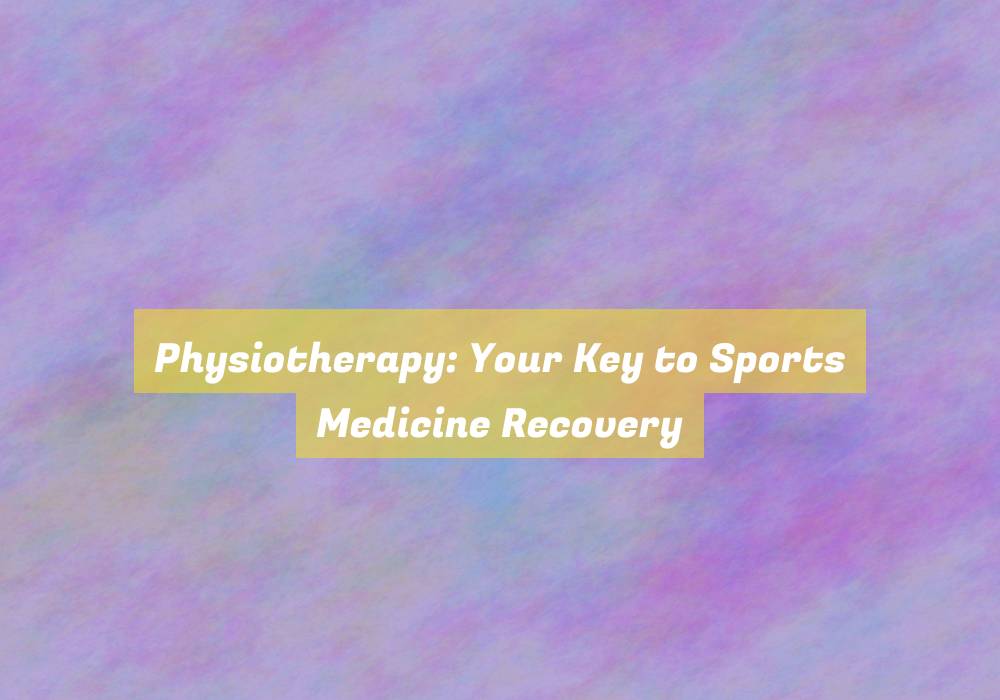Physiotherapy: Your Key to Sports Medicine Recovery
YouG??ve just finished a tough game or workout, and now youG??re dealing with a sports injury. ItG??s a frustrating setback, but before you get discouraged, consider the power of physiotherapy in helping you recover and get back to doing what you love.
You might be surprised at how physiotherapy can not only aid in your recovery but also prevent future injuries and enhance your performance. Whether youG??re a professional athlete or a weekend warrior, integrating physiotherapy into your sports recovery plan could be the key to getting you back in the game stronger than ever.
Benefits of Physiotherapy for Sports Injuries
Physiotherapy offers significant benefits for individuals recovering from sports injuries, aiding in rehabilitation and promoting a faster return to physical activity. By engaging in targeted exercises and therapies under the guidance of a physiotherapist, you can expedite your recovery process. Through personalized treatment plans, physiotherapy helps in restoring strength, flexibility, and mobility, essential components for getting back to your favorite sports. This tailored approach ensures that you address the specific areas affected by your injury, allowing you to regain functionality more efficiently.
Additionally, physiotherapy plays a crucial role in preventing the reoccurrence of sports injuries. By identifying and addressing the root causes of your injury, your physiotherapist can help you develop strategies to strengthen vulnerable areas and improve your overall physical condition. This proactive approach not only supports your current recovery but also reduces the risk of future injuries, enabling you to participate in sports with greater confidence and resilience.
Moreover, physiotherapy provides valuable education on injury management and prevention. YouG??ll learn techniques for proper warm-up, cool down, and stretching, as well as how to recognize warning signs that may indicate potential issues. This knowledge empowers you to take an active role in safeguarding your physical well-being, contributing to long-term athletic success and enjoyment.
Key Techniques Used in Sports Rehabilitation
After understanding the benefits of physiotherapy for sports injuries, youG??ll now explore the key techniques used in sports rehabilitation to further enhance your recovery process.
One of the primary techniques employed in sports rehabilitation is therapeutic exercises. These exercises are specifically designed to target the affected muscles, ligaments, and tendons, aiding in the restoration of strength, flexibility, and overall function.
Another essential technique is manual therapy, which involves hands-on techniques such as massage, joint mobilization, and manipulation to alleviate pain, improve circulation, and enhance joint mobility.
Additionally, neuromuscular re-education is utilized to improve coordination, balance, and proprioception, essential for regaining optimal movement patterns and preventing future injuries.
Modalities like ultrasound, electrical stimulation, and heat or ice therapy are also frequently used to reduce pain and inflammation, promote tissue healing, and facilitate recovery.
Furthermore, functional training is incorporated to simulate sport-specific movements and activities, ensuring a safe return to athletic performance.
Importance of Physiotherapy in Preventing Future Injuries
To minimize the risk of future injuries, integrating physiotherapy into your training regimen is crucial for maintaining optimal physical function and preventing setbacks. Physiotherapy plays a pivotal role in injury prevention by addressing muscle imbalances, improving flexibility, and enhancing overall strength and conditioning.
Through targeted exercises and manual therapy, physiotherapists can help you correct movement patterns and biomechanical issues that may predispose you to injuries during sports or physical activities. By identifying and addressing these underlying issues, physiotherapy empowers you to move more efficiently and with reduced strain on your body, lowering the likelihood of future injuries.
Moreover, physiotherapy not only focuses on the physical aspects of injury prevention but also provides education on proper warm-up techniques, cool-down exercises, and injury management strategies. This comprehensive approach equips you with the knowledge and tools to protect yourself from potential injuries in the long run.
Additionally, by working closely with a physiotherapist, you can develop personalized injury prevention programs tailored to your specific needs and activities, ensuring that youG??re adequately prepared to face the physical demands of your sport or exercise routine.
Embracing physiotherapy as a proactive measure can help you stay injury-free and perform at your best.
Integrating Physiotherapy Into Your Sports Recovery Plan
Minimizing the risk of future injuries requires integrating physiotherapy into your sports recovery plan. Physiotherapy plays a crucial role in maintaining optimal physical function and preventing setbacks. When incorporating physiotherapy into your sports recovery plan, itG??s essential to work closely with a qualified physiotherapist. TheyG??ll assess your individual needs, develop a tailored treatment plan, and guide you through exercises and techniques aimed at enhancing your recovery. By integrating physiotherapy, you can address underlying issues that may have contributed to your sports injury, such as muscle imbalances, weakness, or poor movement patterns.
This proactive approach not only aids in current injury recovery but also reduces the likelihood of recurring issues. Additionally, physiotherapy can help you regain strength, flexibility, and range of motion, enabling you to return to your sport with confidence. ItG??s important to adhere to the recommended physiotherapy sessions to fully benefit from its impact on your sports recovery.
Conclusion
So, if you want to get back in the game quickly and safely, physiotherapy is your key to sports medicine recovery.
With its focus on injury rehabilitation, prevention, and overall physical wellness, physiotherapy can help you recover from sports injuries, improve your performance, and reduce the risk of future injuries.
By integrating physiotherapy into your sports recovery plan, you can ensure a faster, more effective recovery and get back to doing what you love.





